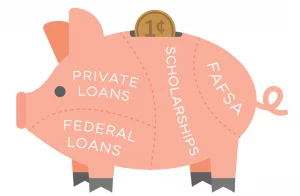The FAFSA, once completed (hopefully with plenty of time before the deadline!), opens the door to a wide variety of types of federal financial aid. The three main categories are loans (subsidized and unsubsidized, PLUS, and consolidation), grants, and federal work-study.
In this post, I will go through each of these three categories and specify which need to be repaid, and which don’t.


Generally speaking, grants you receive from the FAFSA (Pell Grants, Federal Supplemental Educational Opportunity Grants (FSEOG), Teacher Education Assistance for College and Higher Education (TEACH) Grants, and Iraq and Afghanistan Service Grants) do not need to be repaid.
There are, however, a few possible situations in which you might have to repay specific grants that you receive.
For example, if you accept a TEACH grant (this is usually geared towards education majors/students who want to become teachers) and you do not fulfill the full-service obligation, the grant will turn into a loan which you then have to repay with interest.
A loan is defined as money that you borrow from an entity that must be paid back with interest. Each of the various types of loans that are offered and available to students through the FAFSA has its own specific repayment conditions, and they all do require repayment.
Despite this, there are some situations in which you might qualify to have your part (or potentially all) of your federal student loans forgiven, canceled, or discharged.
The best place to learn more about all of those possible situations, for each of the different types of student loans, is on the Student Loan Forgiveness page of the Student Aid website.
Lastly, if you have private student loans, especially with higher interest rates, you may want to look into a private student loan consolidation.
Federal work-study is a program in which you work part-time while you are attending school to help you cover some of your education-related expenses.
Work-study program availability varies by school, but the important thing to know is that the money you earn through your part-time job goes directly to pay off your expenses, and does not need to be repaid.